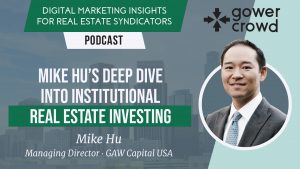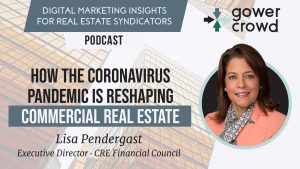Tom McKeon, Clothier Springs Capital Management
How Wealth Managers Invest in Private Real Estate
Tom McKeon, Principal and Chief Investment Officer, Clothier Springs Capital Management

Wealth managers and RIAs are the force multiplier for this effort because they’ve already done all the hard work. Their contacts and client networks are massive, relationships of trust have all already been built, and they advise on investment strategies.
In today's episode you'll find out how Tom structures his practice to channel capital into private real estate and you'll learn what to keep in mind when working with an RIA.
What You're Going to Learn
- Why Diversification is the Key to Maximizing Investment Returns
- The Reasons to Consider Private Real Estate in Your Portfolio
- The Risks of Private Real Estate
- The Tax Benefits of Private Real Estate
- The #1 Secret of a Client-First RIA Business
- How the Solo RIA Is More than Just a Relationship Manager
- And much more!
Listen To or Watch the Full Podcast Here
Show Highlights
FOR REAL ESTATE DEVELOPERS
THE WHITE BOARD WORKSHOP
Learn the exact system best of class sponsors use to raise money online.
Diversification is the Key to Maximizing Investment Returns
Adam: But why did you do that rather than putting individual clients into individual deals?
Thomas: So I've been wearing the portfolio managers hat for 25 plus years now. Diversification is the free lunch in our world. And instead of having all of your eggs in one deal, it made far more sense to me for my clients to say, why don't we put some of your money in 20 different deals? You now get the benefit of the free lunch. If something goes sideways and anything could go sideways, you'll have five percent of your money in it instead of a hundred percent of your money. That is that's the inescapable reality of diversification. It's the free lunch in our world. And I'm trying to I'm trying to find deal sponsors. And, you know, in my journey to get to this point, too, I also came across a speech that the head of the SEC gave a few years ago. And at the time, she said that there was more money raised in the private markets the year before than in the public markets. And as you might expect, it's true of anything in the human experience. Once you start looking, you can start finding things. And then and then maybe some guys start finding you because they find that you're raising money and you could be a candidate for their deal. So I've done multiple deals with a handful of the guys that I have money with in Philadelphia, in Florida, in Texas, because you know what? You know, these guys are in business to keep doing deals as well. Right, I mean, they don't want to just do one off deal and, you know, go sit on the beach. These guys all have operating businesses. They're trying to grow. So once I get a little comfort with some guys, you know, that's a good thing. But I need to keep building the diversification, the geographical diversification, the deal, sponsored diversification, project type diversification. So I'll tell you.
Reasons to Consider Private Real Estate in Your Portfolio
Thomas: First of all, what for an RIA who is thinking about including private real estate in there portfolio or in their, yeah in the portfolio that they offer to there clients. What's the most important thing they should keep in mind?
I think ultimately that it will improve the risk and return profile of a client's portfolio. The expected returns are somewhat higher. The correlation is lower. So the efficiency of a portfolio should move north and west. And that's what everyone in my business wants. They want. And every investor should want this, Max. The maximum risk return tradeoff. Right. This improves that tradeoff. At the cost of a little bit of liquidity. So ultimately, that's what we're all trying to do, is to deliver better returns and less risk to clients. End of discussion, right?
Risks of Private Real Estate
Adam: So what are the what are the biggest risks, Tom? From an RIA's perspective? Let's put it that way.
Thomas: Yes, sure. So I guess liquidity is certainly a permanent concern because, as you know, liquidity lets people pay too much for things because they can always feel like they can get out. Secondly, these are all operating businesses we're investing in. And, you know, the world has just gone through something it's never gone through before.
And one of the lenders that I have in the partnership, said, listen, we're just going to freeze operations for one month. We just want to see what the world looks like. They happen to lend money. They turn around and sell the loans to an investor. That investor has gotten a little sheepish. So they just want to make sure that they're conserving their capital. Which is partly our capital. And so I guess that's that's really the main concern is that that their assumptions about their world, their operating business, their rent stream, whatever it is, isn't going to materialize.
FOR REAL ESTATE DEVELOPERS
THE WHITE BOARD WORKSHOP
Learn the exact system best of class sponsors use to raise money online.
Tax Benefits of Private Real Estate
Adam: What about tax benefits? Are there any tax benefits from the investor perspective of having private real estate?
Thomas: So there's a pooled partnership. Everyone gets a single K1 instead of an individual investor doing 10 different deals and getting 10 different K1s from 10 different deal sponsors. Those deal sponsors report all that up to me and I create a single K1 for people. Most of the stuff will provide long term capital gains, income is going to be income no matter what. Some of these some of these investments will also deliver accelerated depreciation, which is a benefit that publicly traded investments won't provide.
Adam: Right. That you can just to clarify for the uninitiated into the tax code, which is something actually that I have an allergic reaction to every time, accelerated depreciation means that you can deduct that against income and so pay you pay much less tax each year on the income you otherwise get. Correct?
Thomas: That's correct. And the tax code gives me the same willies it gives you and I like to say I defer to my tax advisor for certain things, but I have.
The #1 Secret of a Client-First RIA Business
Adam: Let me just understand how you've structured this, Tom. So am I correct in understanding that the way you have structered this at Clothier Springs Capital Management is that you have created a vehicle, a fund of some sort into which your clients invest, and then they rely upon you to identify assets to real estate, private real estate deals to invest in, so so tell me something about why you did that.
Thomas: So my vehicle is just simply an LLC. I created an LLC. But I manage it like any open ended mutual fund. It's custodied at what's called a qualified custodian, which means they're qualified to hold nontraditional assets, assets that aren't publicly traded. It also means I have to provide all sorts of documentation about the deals, about the investors. I have to provide an annual audit, and that's all. I guess it's all called the Bernie Madoff rule, you know, because it's good to be able to show people that you actually have assets that are actually held somewhere and they actually have a value verified by an independent, you know, accountant.
Adam: So, presumably, and I see this through the lens of real estate. So if you set up a fund and you said you just structured it like a mutual fund, and from a very practical perspective, presumably you are able to charge fees. Are you on the assets under management in charge, out of pocket fees and other fees? That is that's how you make money as an RIA managing this real estate portfolio, is it?
Thomas: Yeah, so it's a full pass through entity. All the expenses and all the returns are completely passed through to the LLC members proportionately. I charge a flat one percent, excuse me, investment advisory fee. But if there's a ten thousand dollar audit fee, the fund, the partnership pays the audit fee. If there's a twenty five hundred dollar qualified custodial fee, the fund pays that. Any income that comes in from the lenders, any income comes in from the multifamily deal sponsors - that all flows straight into the LLC as well. So I really want to make this a complete pass through and take a nominal fee for my little, you know, my little
The Solo RIA – More than Just a Relationship Manager
Adam: So you are not affiliated with a large company, so you don't have to go through a you are your own shop, basically. You don't have to go through an approval committee to decide what to invest in. Is that right?
Thomas: I am the approval committee.
Adam: You are committee, right.
Thomas: And I am trying to differentiate myself in this this real estate, you know, tool is actually, one you know, one way to do that. But having said that, I think largely a lot of the RIAs in our world are really relationship managers first and foremost, and that they have an RIA. They're registered, but quite often they just turn around and they dump the whole business on a turnkey platform like SEI or Envestnet. And so the RIA is really not even an allocator or certainly not a portfolio manager. They're really just a relationship manager. So if their vendor can't buy it off the shelf, it doesn't happen, you know, so that tends to be limited to the world of publicly traded investments. So being a, you know, a portfolio manager, I just thought, why don't I put that together myself instead of buying something off the shelf that's going to cost three times more than what I can do it for because I'm really trying to give my clients the best net returns possible. Certainly, I'm an anomaly, you know, doing this myself. I don't know anyone that's done this. Any independent RIA, I don't know anyone that's done this.
A guide for remote workers
How to Setup a TV Studio Quality Home Office














